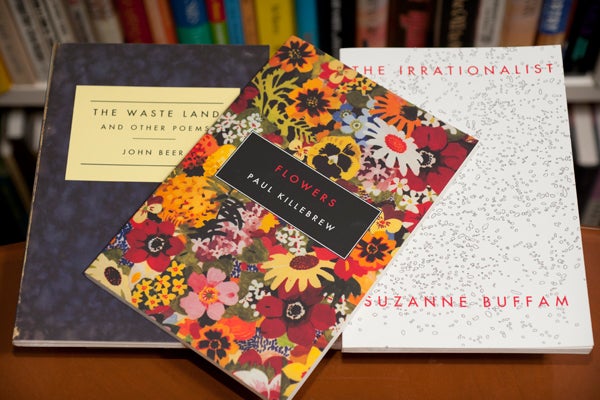|
August 4, 2011
Small poetry press founded by Stanford lecturer garners critical attention
Canarium Books, founded by recent Stegner Fellow and lecturer Joshua Edwards, has a critical reputation that belies its budget. By Max McClure

Canarium Books was founded to serve as a book-length soapbox for poets the editors had known for years but who hadn't yet found a publishing deal. (Photo: Linda A. Cicero / Stanford News Service) This morning the police came for me.
They brought a letter covered with signs
I could not decipher. They demanded
I register my address properly,
because they are sorely tested by time's demands
and cannot function as my delivery service.
—John Beer, "The Waste Land"
The standard print run for a small literary press is about 1,000 copies per book. In the grand scheme of things, this isn't much – Oprah could have given that many books away to three studio audiences. But when the book is full of experimental poetry, 1,000 units move slowly.
So when poetry press Canarium Books found itself sold out of two of its most recent titles, it was a little surprised. When those same two books recently won major literary prizes from the Poetry Society of America and the Griffin Trust, Canarium's founders were ecstatic.
"It's sort of mystifying," said Joshua Edwards, Canarium founder and editor and 2009-2011 Stegner Fellow and lecturer at Stanford.
Canarium, based in Edwards' hometown of Clear Lake Shores, Texas, is a young press, and it specializes in a notoriously unmarketable genre. As defined by Edwards and his co-editors – Robyn Schiff, Nick Twemlow and Lynn Xu – Canarium focuses on innovative lyric poetry by emerging authors.
This year's crop of Canarium titles was no exception. John Beer's The Waste Land is the poet's first book, and Suzanne Buffam's The Irrationalist is her second. Both lace melodiously conversational poems with dense allusion and frequent humor. Neither book would be considered a conventional blockbuster.
But now, Beer has won the Poetry Society of America's Norma Farber First Book Award and has been shortlisted for The Believer magazine's Poetry Award. John Ashbery, often cited as the major American poet of the past 50 years, referred to Beer's work as "genius." Buffam made the shortlist for the Griffin Poetry Prize – Canada's largest poetry award, previously given to figures like Anne Carson, Christian Bök and Robin Blaser.
"We don't go for sales or awards – we just try and publish the best poetry we find," said Edwards. "Still, it's a great thing for only our second season of books."
During the course of his Stegner Fellowship, Edwards completed a few projects of his own. This year, Noemi Press published Campeche, his poetic collaboration with his photographer father. And Edwards' translation of María Baranda's Ficticia (Shearsman Books) was recently nominated for a 2011 Northern California Book Award.
"It's not going out on a limb at all," said Edwards, to point to the Stegner Fellowship as "bolstering my interest in rogue elements in the poetry world – people who were both tastemakers and went against the grain."
But Canarium wasn't founded as a mouthpiece for one literary approach. The press was meant to serve as a book-length soapbox for poets the editors had known for years but who hadn't yet found a publishing deal. Beer and Buffam both published in The Canary – the literary magazine Edwards and Twemlow ran for six years before Canarium.
Once Edwards' alma mater – the University of Michigan MFA Program in Creative Writing – began to provide financial and editorial staff support, the editors were able to position the press as a publishing advocate.
"It's a cliché, but that's why the press has almost a family feeling," said Edwards.
And like a family, Canarium and its authors travel with each other. Following a business model unchanged by either critical attention or e-commerce, the publishing house still makes most of its sales by hawking copies during book tours.
Now, just off a 13-stop trip along the West Coast, Canarium is gearing up for a series of Midwestern appearances. Edwards and a few of his authors will hit the road together, reading at a new town each night – "like a rock band," as he put it. "Except that we're in bed before midnight."
Edwards will return to Stanford in the fall as the William Chace Poetry Lecturer in Continuing Studies.
Max McClure is an intern for the Stanford News Service.
-30-
|